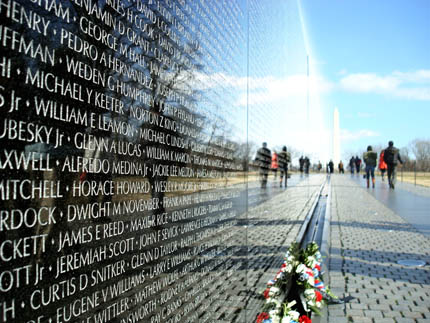20 January 2010
Wall and Remembrance

(Reflections on Black Granite)
Rex retired in 1976, at the rank of Vice Admiral. As you know, there is no permanent grade for officers above that of Rear Admiral; retirement in the grade of Vice Admiral requires concurrence by the Senate. That body remembered his service with satisfaction, and agreed.
It was a challenging time. Gerald Ford in fact soothed some of the national angst over the downfall of Richard Nixon, and if he also served as a foil for Chevy Chase on Saturday Night Live, he certainly seemed to go along with the joke.
I was at the stately Pantlind Hotel in the brown-brick city of Grand Rapids, Michigan, the night before the election, and Jerry (can’t think of anything else to call him) seemed relieved that the long campaign against the insurgent Governor from Georgia was finally over.
Jerry carried the state the next day with a narrow margin, but it was not enough to alter the outcome of a nation that was tired of the way things were going and prepared to start off on a new path.
Things had been changing in the Government, particularly in the national security sphere where Rex spent his final tour.
The Ford Administration had clashed with Congress on foreign policy, in Southeast Asia and elsewhere. Congress denied Ford's attempts to send increased military aid to Cambodia and Vietnam after the decisive communist offensive began in April 1975. In the end, funds were available only for the evacuation of personnel; and in the last sixteen hours before Saigon fell some 6,500 Americans and Vietnamese were airlifted out by helicopter.
My pal Sid was assigned as the intelligence officer for the Oceanographer of the Navy, a grand sounding position that had its challenges, since the weather, and the weather guessers, will do what they will. He called the job as being a lot like a "Moose who didn't need a hat rack."
Like many who had given so much personal time to the war, he kept a provincial map of Vietnam tacked up behind his desk, and crossed them off from North to South as the NVN forces steadily conquered the south Vietnamese "defenders" all the way down to the capital.
It was a sad time for millions, and a time of justification for the righteous northerners and their vocal supporters here in the U.S.
Ford ordered the small remaining contingent of U.S. embassy and security personnel to leave while Marines held back crowds of Vietnamese who had loyally supported the United States. My ship- Midway will always be my ship- was there for the operation that was termed “FREQUENT WIND,” and the sad footnote to the long war of the Mayaguez Incident.
Two weeks after the fall of Saigon, Khmer Rouge naval forces operating former U.S. Navy "Swift Boats" seized the American container ship SS Mayaguez. They removed its crew for questioning on Koh Tang Island. The crew had been released in good health, before a Presidentially-authorized attack by US Marines. The names of the Americans killed on Koh Tang Island, including those of three men left behind, are the last ones inscribed on The Wall at the Vietnam Veterans Memorial.
Of course, we had not got very far down the controversial road to building the Wall, or dealing with the consequences of the war in Rex’s last year of active duty.
Rex was responsible for the national funding provided to keep the lights on at the Defense Intelligence Agency and the military Departments. With the steep decline in the amount requested in the President’s budget, new and creative means had to be found to distribute the cash equitably.
The Williamsburg Agreement was truck to do precisely that. The Services would be left to their own Title 10 responsibilities to program for intelligence systems and manning.
The national intelligence community, under the auspices of the brand-new Intelligence Community Staff, would provide funds for DIA, the Air Force Strategic Reconnaissance and Technical Squadrons (Like the 547th RTG at Hickham), the Army’s Echelon-above-Corps MI Brigades (like the 66th MI in Germany), and the Navy’s Fleet Intelligence Centers at Pearl and Norfolk, and Ocean Surveillance System scattered around the world.
It was not a perfect system and it was anything but elegant. That is what occupied Rex’s time, right through the end of his active duty time.
I cannot bring myself to bludgeon you further with the emotion that went into the compromise required to align resources against the Threat; Big Navy naturally turned to the Soviets and Admiral Gorshkov’s new Blue Water Navy.
When Rex retired, he became an investment banker in his hometown of Pittsburgh. He spent seven year in charge of municipal bonds and assisted with the underwriting of many school and other important community projects.
He was nearing his second retirement as the excitement and tension began to rise over the Wall. On July 1, 1980, in the Rose Garden, President Jimmy Carter signed Public Law 96-297 that provided a site in Constitution Gardens for a new memorial.
It was very near where the old Main Navy and Munitions Buildings once stood. It was about healing and it was about remembrance, but it was not going to be without controversy.
We will get to that tomorrow.
Copyright 2010 Vic Socotra
www.vicsocotra.com
Subscribe to the RSS feed!